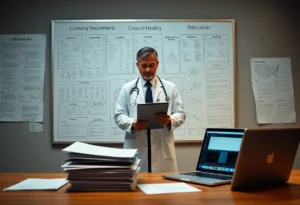Many doctors face the challenge of navigating licensing and certification requirements when relocating to a new country or state. As you begin on this journey, it’s vital to understand the specific regulations that will impact your ability to practice medicine in your new location. From verifying your credentials to understanding local medical boards and examinations, having the right information will help ensure a smoother transition. This post will guide you through the key steps needed to maintain your professional status and provide quality care in your new environment.

Overview of Licensing And Certification
While relocating as a doctor, understanding the various licensing and certification requirements is vital to your practice in a new location. These requirements can differ significantly from one region to another and may impact your ability to operate legally and effectively. Familiarizing yourself with the specific regulations in your new jurisdiction will help ensure a smoother transition and allow you to focus on providing care to your patients.
Importance of Licensing
The process of obtaining a medical license is fundamental to your ability to practice medicine legally. Without a valid license, you risk facing legal repercussions, including fines and restrictions on your ability to work. Additionally, maintaining a license reflects your commitment to responsibility, professionalism, and dedication to your field, which can enhance your credibility among peers and patients alike.
Types of Certifications Available
Certifications can enhance your qualifications and make you a more attractive candidate for potential employers. Various types of certifications may be available to you, depending on your specialty and the location to which you relocate. Some common certifications include:
- Board-certified physician in your specialty
- Advanced cardiac life support (ACLS)
- Pediatric advanced life support (PALS)
- Basic life support (BLS)
- Advanced trauma life support (ATLS)
The importance of obtaining these certifications lies in their ability to not only demonstrate your expertise but also to ensure you are equipped with the latest techniques and knowledge necessary for high-quality patient care.
| Type of Certification | Description |
| Board Certification | Recognition by a professional board in your specialty. |
| ACLS | Training for handling cardiovascular emergencies. |
| PALS | Training focused on emergency care for children. |
| BLS | Basic training for life-saving techniques. |
| ATLS | Comprehensive course for trauma management. |
Understanding Licensing
Licensing is the legal permission granted by a state or national authority, allowing you to practice medicine in that specific location. Each state has its processes and requirements, often including an application, background checks, and examinations. It’s important to familiarize yourself with these requirements as they may influence the speed at which you can begin working in your new area.
- State-specific application processes
- Examinations, such as USMLE or COMLEX
- Background checks including criminal history
- Proof of residency and education
- Continuing education requirements for renewal
| Type of License | Description |
| Full License | Complete approval for unrestricted practice. |
| Temporary License | Short-term practice during application process. |
| Special License | Allows practice in specific settings or under certain conditions. |
| Resident License | Limited to residents in training programs. |
| Reciprocity License | Licensing based on a license from another state. |
State-Specific Requirements
The process of relocating as a doctor involves understanding the specific licensing requirements that vary from state to state. Each state in the U.S. has its own medical board, responsible for regulating the practice of medicine, including overseeing the licensure process, handling disciplinary actions, and ensuring that practitioners meet the required standards of care. It is vital for you to familiarize yourself with the specific regulations in the state you plan to move to, as what works in one state may not apply in another. This includes application processes, exam requirements, or even continuing education expectations that you must fulfill to gain and maintain your license.
Variations in Licensing by State
Behind the official requirements, nuances exist that can affect your transition into a new state’s medical practice. For instance, while some states might allow specific licensure pathways such as endorsement or reciprocity for those already licensed elsewhere, others may require you to complete a residency program or obtain additional certifications. Additionally, certain states may have stricter requirements for specific specialties, making it imperative for you to assess these regulations closely.
Researching State Medical Boards
At the forefront of understanding state-specific requirements is your need to research the medical board of the state you’re relocating to. This involves not only visiting the official website of the board to gather information on licensure requirements but also reading any updates on legal and procedural changes that could impact your ability to practice medicine there. Networking with local medical professionals can provide you with insider knowledge on the application experience and any pitfalls to avoid.
Consequently, taking the time to thoroughly investigate and understand the requirements of the state medical board can significantly streamline your relocation process. You can find relevant forms, imperative contacts, and detailed guides on the process that will help ensure that your transition into your new practice setting is as smooth as possible. By being proactive and well-informed, you position yourself to meet all the necessary criteria required to practice medicine in your new state without delay.
The Application Process
Some doctors may find the application process for licensing and certification to be quite daunting, especially when relocating. Each state or country has its unique regulatory body that oversees medical practice, demanding a thorough understanding of their specific application procedures. Therefore, it is vital that you prepare adequately to navigate these requirements smoothly, ensuring you gather all necessary details and submit completed applications on time.
Documentation Needed
An imperative first step in your application process is compiling the required documentation. This typically includes proof of your medical degree, transcripts from your medical school, proof of completion of residency training, letters of recommendation, and proof of passing relevant licensing exams such as the USMLE or COMLEX. You may also need to provide documentation of your medical practice history and any continuing medical education records. Ensuring that all paperwork is accurate and complete will help facilitate a smoother review process.
Timelines and Fees
Among the many factors to consider, timelines and fees for your application can vary significantly by jurisdiction. Generally, the application process can take anywhere from a few weeks to several months, depending on the efficiency of the licensing board and your promptness in submitting required documents. Fees can range from a few hundred to over a thousand dollars, which may include application fees, examination costs, and additional charges for credential evaluation.
Also, it’s advisable to budget for unexpected costs, such as re-examination fees or additional documentation requests, which can extend the overall timeline. Knowing the typical duration and associated fees will help you plan better, enabling you to manage your finances and schedule accordingly as you prepare for your relocation and new medical practice.
Exam and Continuing Education Requirements
Many factors come into play when it comes to meeting the exam and continuing education requirements associated with relocating as a doctor. Understanding these necessities is vital to ensure compliance with the medical licensing process in your new state or country. They generally include passing certain examinations that validate your knowledge and competency in the medical field, as well as fulfilling ongoing education standards that keep you abreast of the latest advancements and practices in medicine.
Necessary Examinations
Examinations are a standard component of the licensing process for medical professionals. Each state or country may require different tests, which can include the United States Medical Licensing Examination (USMLE) for those practicing in the U.S., or other specialized assessments that focus on your chosen area of medicine. You need to familiarize yourself with these requirements, as they are designed to ensure that you possess the necessary skills and knowledge to provide safe and effective care to patients.
Ongoing Education Standards
By committing to ongoing education standards, you will be able to maintain your licensure and enhance your professional competence. Most states or professional organizations require you to complete a specific number of continuing medical education (CME) credits within a designated time frame. These credits can be obtained through various activities, including workshops, courses, and seminars that are tailored to your specialty. It’s imperative to remain aware of the specific requirements in your new location to ensure that you fulfill all necessary criteria for maintaining your medical license.
Due to the ever-evolving nature of the medical field, ongoing education not only serves as a requirement but also empowers you to stay current on best practices and innovations. Engaging in continuing education provides you with opportunities to learn from industry experts, network with peers, and further refine your skills. In the long run, this commitment reinforces your capability to deliver high-quality healthcare and helps you adapt to new methodologies and technologies that enhance patient care.
Addressing Common Challenges
Not every aspect of relocating as a doctor comes easy. One of the significant hurdles you might face is the intricate web of bureaucracy inherent in the medical licensing and certification processes. Each state or country has its regulatory body, with specific requirements that can seem overwhelming. You will likely have to navigate through various forms, procedures, and requirements that may feel unfamiliar and complex. It is crucial to be well-informed about these bureaucratic structures and to approach them with patience and diligence to ensure a smooth transition into your new role.
Navigating Bureaucracy
Below the surface of these bureaucratic systems lies a multitude of forms and regulations that you will need to familiarize yourself with. Often, each licensing authority will require documentation such as proof of your medical education, examination scores, and verification of your residency training. Adding to this complexity, timelines and processes can vary significantly depending on where you are relocating. You will benefit greatly from planning ahead and seeking guidance from colleagues or professionals who have already made similar transitions. Researching the requirements well in advance can alleviate some stress, assisting you in managing your expectations effectively.
Dealing with Delays and Denials
Bureaucracy can sometimes lead to frustrating delays and potential denials in your licensing process. If you encounter a setback, it’s important to maintain open lines of communication with the licensing board to address the issue. Often, a simple misunderstanding or a missing document can result in delays. Understanding the typical timelines and proactively following up can help you stay informed about your application status. In cases where you face denial, being prepared to appeal with the necessary documentation and a clear explanation of your circumstances can increase your chances of a favorable outcome.
Understanding the reasons behind delays or denials is fundamental. When you pinpoint the cause of your issue, whether it’s procedural or documentation-related, you can address it more effectively. Staying organized and maintaining thorough records of your submissions will serve you well in these situations. Moreover, connecting with professional organizations can provide you with resources and support, as they often have insights and tips based on collective experiences that can guide you through these obstacles. By being persistent and well-prepared, you can navigate these challenges and move forward with your career seamlessly.

Resources for Relocating Doctors
All doctors considering relocation will benefit from tapping into various resources available to make the transition smoother. Professional organizations and support groups can offer invaluable connections, information, and advocacy as you navigate the complexities of moving to a new location. These entities often provide tailored guidance based on the unique requirements of each state or country, assisting you in understanding local licensing and certification processes. Engaging with peers who have undergone similar experiences can also help alleviate some of the uncertainties you may face during your relocation journey.
Professional Organizations and Support Groups
Along your journey, you can explore several professional organizations that focus on supporting doctors who are relocating. Groups like the American Medical Association (AMA) or specialty-specific associations can provide you with resources and networking opportunities to help you establish yourself in a new community. Furthermore, joining local or regional support groups can connect you with fellow healthcare professionals, allowing you to share experiences and gain insights that can ease your transition.
Online Tools and Websites
To streamline your relocation process, take advantage of various online tools and websites designed specifically for physicians. Websites dedicated to medical licensure can provide step-by-step guides on the necessary documents and processes you’ll need to complete before you can practice in your new location. Additionally, platforms that aggregate job openings in your field can help you identify potential employment opportunities, enabling you to conduct your job search effectively from afar.
Hence, utilizing online resources not only saves you time but also ensures you are well-informed. Numerous websites offer state-specific regulations, exam tips, and imperative contact information for licensing boards. Online communities and forums where medical professionals discuss their relocation experiences can also prove helpful. By leveraging these digital tools, you can create a comprehensive plan that addresses all aspects of your move, from licensure to job searching, ultimately leading to a smoother transition into your new professional environment.
Final Words
Upon reflecting on the complexities of relocating as a doctor, it is necessary for you to grasp the intricacies of licensing and certification requirements in your new state or country. Each jurisdiction may have its own set of regulations that govern the practice of medicine, including necessary exams, documentation, and continuing education mandates. By familiarizing yourself with these requirements early in your relocation process, you can streamline your transition and ensure that your medical license remains active without unnecessary delays.
Furthermore, engaging with local medical boards or professional organizations can provide you with valuable resources and insights tailored to your specific location. These organizations often offer guidance on the application process, timelines, and any additional qualifications you might need to meet. Navigating this landscape efficiently will not only enhance your professional journey but also allow you to focus more on your patients and practice once you’ve settled into your new environment.




